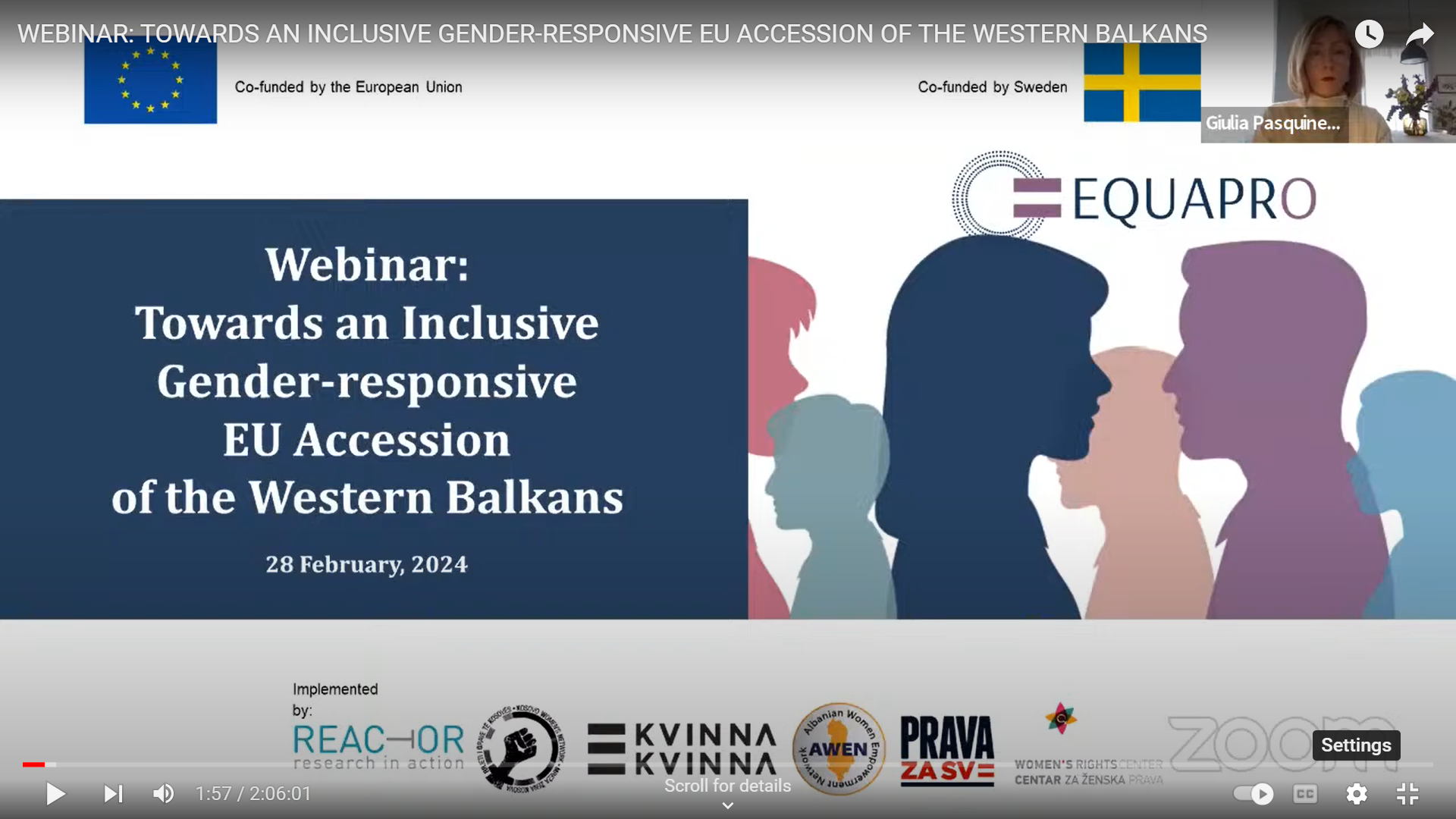
On February 28, 2024, the Coalition for Gender Equality in the EU Accession Process (EQUAPRO) presented key findings and recommendations from its latest monitoring report: “Towards an Inclusive Gender-responsive EU Accession of the Western Balkans” via an online event involving more than a hundred participants from across the Western Balkans (WB) and European Union (EU). The report examines the extent to which the EU and WB governments have integrated a gender perspective in the EU Accession process, comparing progress in 2021 and 2022.
During her opening remarks, Hillen Francke, Head of the Sector for Civil Society, Social Inclusion and Human Capital Development in the WB and Turkey at the European Commission, highlighted the importance of a gender responsive and participatory EU Accession process. “Gender equality and women’s rights are key elements of the enlargement process, and projects like this one help us identify what are the remaining challenges and what are the main drivers for change,” she said.
“We believe that monitoring the EU Accession process through gender lenses is crucial for civil society, national stakeholders and the EU,” said Tania Ivanova, Regional Program Manager and President of Reactor – Research in Action. “This Action has shown what joint actions we can do together as a region. We can contribute to the transformation of our societies and make them more humane by improving gender mainstreaming in our countries and contributing to shadow reporting but also towards policy creation and decision making. These must involve women because they are half of our society, and their voices need to be heard and their needs addressed.”
Giulia Pasquinelli, Policy and Advocacy Adviser for the WB at the Kvinna till Kvinna Foundation, presented the main findings and recommendations from the regional report. “The EU Accession process remains the main driver of pro-democratic reforms and advancement on fundamental values, including gender equality, in the Western Balkans, however the results so far have been mixed,” she said. “While the findings of the reports show, and the women’s rights groups’ advocacy activities contributed to, some positive developments, further monitoring would be necessary to assess how substantive, transformative, and sustainable these changes are. Greater efforts towards transparency and inclusion are needed,” she concluded.
Then, representatives from EQUAPRO partner organizations in each country shared the key findings from country briefs, highlighting key challenges and best practices across the region. Key issues noted included the need for the EU and governments to engage diverse women’s rights organisations in regular, structured, and inclusive political dialogues; to further political will for integrating a gender perspective in decision and policymaking; to establish structures and systems that would enhance accountability, including within the European Commission’s OPSYS data management system and in gender marking EU-funded Actions; and to ensure adequate attention to the women, peace and security agenda by better engaging women’s rights organizations in gender analysis and interventions to further peace and security in the region.
The monitoring reports utilized a comprehensive methodology for monitoring and reporting on areas relevant to the EU Accession process from a gender perspective including 50 bespoke indicators under 10 criteria, including 45 national and 5 regional indicators. EQUAPRO partner organizations will continue monitoring this process in the future.
This event was organized as part of the “Furthering Gender Equality through the EU Accession Process Action” (2021-2024), which is enhancing regional cooperation among women’s rights civil society organizations, providing gender analyses to inform policymaking, supporting evidence-based advocacy towards integrating a gender perspective in the EU Accession process, and monitoring reforms related to the EU Accession process from a gender perspective. This Action is co-funded by the EU and Sweden and implemented by the EQUAPRO Coalition, which involves six partner organizations: Reactor – Research in Action (North Macedonia), The Kvinna till Kvinna Foundation (North Macedonia Office), the Kosovo Women’s Network, the Albanian Women’s Empowerment Network, Rights for All (Bosnia and Herzegovina), and the Women’s Rights Centre (Montenegro).
The report is available here.